(完整word版)2018年高考英语真题(新课标全国一卷)有答案(2)
2018年高考英语真题(新课标全国一卷)有答案
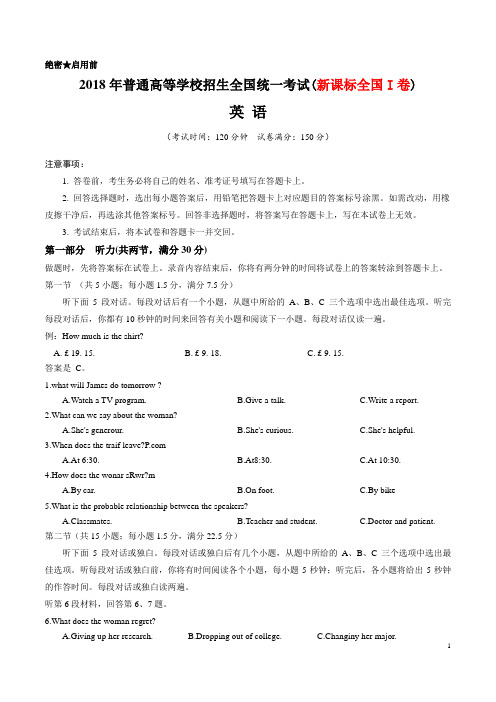
绝密★启用前2018年普通高等学校招生全国统一考试(新课标全国I卷)英语(考试时间:120分钟试卷满分:150分)注意事项:1. 答卷前,考生务必将自己的姓名、准考证号填写在答题卡上。
2. 回答选择题时,选出每小题答案后,用铅笔把答题卡上对应题目的答案标号涂黑。
如需改动,用橡皮擦干净后,再选涂其他答案标号。
回答非选择题时,将答案写在答题卡上,写在本试卷上无效。
3. 考试结束后,将本试卷和答题卡一并交回。
第一部分听力(共两节,满分30分)做题时,先将答案标在试卷上。
录音内容结束后,你将有两分钟的时间将试卷上的答案转涂到答题卡上。
第一节(共5小题;每小题1.5分,满分7.5分)听下面5段对话。
每段对话后有一个小题,从题中所给的A、B、C三个选项中选出最佳选项。
听完每段对话后,你都有10秒钟的时间来回答有关小题和阅读下一小题。
每段对话仅读一遍。
例:How much is the shirt?A. £ 19. 15.B. £ 9. 18.C. £ 9. 15.答案是C。
1.what will James do tomorrow ?A.Watch a TV program.B.Give a talk.C.Write a report.2.What can we say about the woman?A.She's generour.B.She's curious.C.She's helpful.3.When does the traif leave?A.At 6:30.B.At8:30.C.At 10:30.4.How does the wonar sRwr?mA.By car.B.On foot.C.By bike5.What is the probable relationship between the speakers?A.Classmates.B.Teacher and student.C.Doctor and patient.第二节(共15小题;每小题1.5分,满分22.5分)听下面5段对话或独白。
(word完整版)2018年全国1卷英语高考试题及参考答案word

绝密★启用前2018年普通高等学校招生全国统一考试英语(考试时间:120分钟试卷满分:150分)注意事项:1. 答卷前,考生务必将自己的姓名、准考证号填写在答题卡上。
2. 回答选择题时,选出每小题答案后,用铅笔把答题卡上对应题目的答案标号涂黑。
如需改动,用橡皮擦干净后,再选涂其他答案标号。
回答非选择题时,将答案写在答题卡上,写在本试卷上无效。
3. 考试结束后,将本试卷和答题卡一并交回。
第一部分听力(共两节,满分30分)做题时,先将答案标在试卷上。
录音内容结束后,你将有两分钟的时间将试卷上的答案转涂到答题卡上。
第一节(共5小题;每小题1.5分,满分7.5分)听下面5段对话。
每段对话后有一个小题,从题中所给的A、B、C三个选项中选出最佳选项。
听完每段对话后,你都有10秒钟的时间来回答有关小题和阅读下一小题。
每段对话仅读一遍。
例:How much is the shirt?A. £ 19. 15.B. £ 9. 18.C. £ 9. 15.答案是C。
1.what will James do tomorrow ?A.Watch a TV program.B.Give a talk.C.Writea report.2.What can we say about the woman?A.She's generour.B.She's curious.C.She's helpful.3.When does the traif leave?A.At 6:30.B.At8:30.C.At4.How does the wonar sRwr?mA.By car.B.On foot.C.By bike5.What is the probable relationship between the speakers?A.Classmates.B.Teacher and student.C.Doctor and patient.第二节(共15小题;每小题1.5分,满分22.5分)听下面5段对话或独白。
(完整word版)2018全国高考英语完型填空真题汇编(含答案)(2),推荐文档

During my second year at the city college, I was told that the education department was offering a “free” course, called Thinking Chess, for three credits. I41 the idea of taking the class because, after all, who doesn’t want to42 a few dollars? More than that, I’d always wanted to learn chess. And, even if I weren’t43 enough about free credits, news about our 44 was appealing enough to me. He was an international grand master, which 45 I would be learning from one of the game’s46 I could hardly wait to 47 him.Maurice Ashley was kind and smart, a former graduate returning to teach, and this 48 was no game for him; he meant business. In his introduction, he made it 49 that our credits would be hard-earned. In order to 50 the class among other criteria, we had to write a paper on how we plan to 51 what we would learn in class to our future professions and 52 .to our lives.I managed to get an A in that 53 and leaned life lessons that have served me well beyond the54 .Ten years after my chess class with Ashley, I' m still putting to use what he 55 me:“the absolute most important 56 that you learn when you play chess is how to make good 57 . On every single move you have to 58 a situation, process what your opponent (对手) is doing and 59 the best move from among all your options.” These words s till ring true today in my 60 as a journalist.41. A put forward B jumped at C tried out D turned down42. A waste B earn C save D pay43. A excited B worried C moved D tired44. A title B competitor C textbook D instructor45. A urged B demanded C held D meant46. A fastest B easiest C best D rarest47. A interview B meet C challenge D beat48. A chance B qualification C honor D job49. A real B perfect C clear D possible50. A attend B pass C skip D observe51. A add B expose C apply D compare52. A eventually B naturally C directly D normally53. A game B presentation C course D experiment54. A criterion B classroom C department D situation55. A taught B wrote C questioned D promised56. A fact B step C manner D skill57. A grades B decisions C impressions D comments58. A analyze B describe C rebuild D control59. A announce B signal C block D evaluate60. A role B desire C concern D behaviorTwo weeks earlier, my son, Ben, had got in touch. He’d moved to England with his mum when he was three and it had been 13 years since I’d __41__ seen him. So imagine my __42__ when he emailed me saying he wanted to come to visit me.I was __43__! I arrived early at Byron Bay where we were supposed to __44__. The bay was __45__ in sunshine, and there was a group of kayakers around 150m off the shore. Getting a little __46__, I realized one kayak(皮划艇)was in __47__. "Something’s not __48__!"I took off my T-shirt and __49__ into the water. I saw there were two instructors on board and a man lying across the middle. He was __50__ violently. Linking arms with one of the instructors, I helped __51__ the young man out of the water. He was unconscious and as I looked at his face, something __52_ to me. Those brown eyes were very __53__. "What’s his name?"I asked the instructor. "Ben,"he replied, and immediately I __54__. That stranger was my son!The instructors called for an ambulance. __55__, after a brief stay in hospital, Ben was well enough to be allowed to __56__ and later the family met up for dinner. We chatted about everything and then Ben __57__ to me. "I just want to say thank you,"he said. "You __58__ my life!"I still can’t believe what a __59__ it was. I’m just so glad I was there __60__ to help my son.41. A. also B. often C. even D. last42. A. delight B. relief C. anger D. worry43. A. scared B. shocked C. thrilled D. ashamed44. A. talk B. stay C. meet D. settle45. A. bathed B. clean C. deep D. formed46. A. faster B. closer C. heavier D. wiser47. A. trouble B. advance C. question D. battle48. A. real B. right C. fair D. fit49. A. stared B. sank C. dived D. fell50. A. arguing B. fighting C. shouting D. shaking51. A. lead B. persuade C. carry D. keep52. A. happened B. occurred C. applied D. appealed53. A. sharp B. pleasant C. attractive D. familiar54. A. agreed B. hesitated C. doubted D. knew55. A. Fortunately B. Frankly C. Sadly D. Suddenly56. A. return B. relax C. speak D. leave57. A. joked B. turned C. listened D. pointed58. A. created B. honored C. saved D. guided59. A. coincidence B. change C. pity D. pain60. A. on board B. in time C. for sure D. on purposeWhen most of us get a text message on our cell phone from an unknown person, we usually say "sorry, __41__ number!"and move on. But when Dennis Williams __42__ a text that clearly wasn’t intended for him, he did something __43__.On March 19, Dennis got a group text __44__ him that a couple he didn’t know were at the hospital, waiting for the __45__ of a baby."Congratulations! But I think someone was mistaken,"Dennis __46__. The baby was born and update texts were __47__ quickly from the overjoyed grandmother, Teresa. In her __48__, she didn’t seem to realize that she was __49__ the baby’s photos with a complete stranger. "Well, I don’t __50__ you all but I will get there to take pictures with the baby,"replied Dennis before asking which room the new __51__ were in.Much to the family’s surprise, Dennis stuck to his __52__! He turned up at the hospital __53__ gifts for the new mother Lindsey and her baby boy. Lindsey’s husband was totally __54__ by the unexpected visit. "I don’t think we would have randomly invited him over but we __55__ it and the gifts."Teresa __56__ a photo of the chance meeting on a social networking website __57__ by the touching words: "What a __58__ this young man was to our family! He was so __59__ and kind to do this."The post has since gained the __60__ of social media users all over the world, receiving more than 184,000 shares and 61,500 likes in just three days.41.A. unlucky B. secret C. new D. wrong42.A. received B. translated C. copied D. printed43.A. reasonable B. special C. necessary D. practical44.A. convincing B. reminding C. informing D. warning45.A. wake-up B. recovery C. growth D. arrival46.A. responded B. interrupted C. predicted D. repeated47.A. coming in B. setting out C. passing down D. moving around48.A. opinion B. anxiety C. excitement D. effort49.A. comparing B. exchanging C. discussing D. sharing50.A. accept B. know C. believe D. bother51.A. parents B. doctors C. patients D. visitors52.A. dream B. promise C. agenda D. principle53.A. bearing B. collecting C. opening D. making54.A. discouraged B. relaxed C. astonished D. defeated55.A. admit B. need C. appreciate D. expect56.A. found B. selected C. developed D. posted57.A. confirmed B. simplified C. clarified D. accompanied58 .A. pity B. blessing C. relief D. problem59.A. smart B. calm C. sweet D. fair60.A. sympathy B. attention C. control D. trustThe Homeless HeroFor many, finding an unattended wallet filled with £400 in cash would be a source(来源)of temptation(诱惑). But the __16__ would no doubt be greater if you were living on the streets with little food and money. All of this makes the actions of the homeless Tom Smith __17__more remarkable.After spotting a __18__ on the front seat inside a parked car with its window down, he stood guard in the rain for about two hours waiting for the __19__ to return.After hours in the cold and wet, he __20___ inside and pulled the wallet out hoping to find some ID so he could contact(联系)the driver, only to __21__ it contained £400 in notes, with another £50 in spare change beside it.He then took the wallet to a nearby police station after __22__ a note behind to let the owner know it was safe. When the car’s owner John Anderson and his colleague Carol Lawrence returned to the car—which was itself worth £35, 000—in Glasgow city centre, they were __23__to find two policemen standing next to it. The policemen told them what Mr. Smith did and that the wallet was __24__.The pair were later able to thank Mr. Smith for his __25__.Mr. Anderson said: "I couldn’t believe that the guy never took a penny. To think he is sleeping on the streets tonight __26__ he could have stolen the money and paid for a place to stay in. This guy has nothing and __27__ he didn’t take the wallet for himself;he thought about others __28__. It’s unbelievable. It just proves there are __29__ guys out there."Mr. Smith’s act __30__ much of the public’s attention. He also won praise from social media users after Mr. Anderson __31__ about the act of kindness on Facebook.Now Mr. Anderson has set up an online campaign to __32__ money for Mr. Smith and other homeless people in the area, which by yesterday had received £8,000. "I think the faith that everyone has shown __33__ him has touched him. People have been approaching him in the street; he’s had job __34__ and all sorts,"Mr. Anderson commented.For Mr. Smith, this is a possible life-changing __35__. The story once again tells us that one good turn deserves another.16. A. hope B. aim C. urge D. effort17. A. still B. even C. ever D. once18. A. wallet B. bag C. box D. parcel19. A. partner B. colleague C. owner D. policeman20. A. turned B. hid C. stepped D. reached21. A. discover B. collect C. check D. believe22. A. taking B. leaving C. reading D. writing23. A. satisfied B. excited C. amused D. shocked24. A. safe B. missing C. found D. seen25. A. service B. support C. kindness D. encouragement26. A. when B. if C. where D. because27. A. rather B. yet C. already D. just28. A. too B. though C. again D. instead29. A. honest B. polite C. rich D. generous30. A. gave B. paid C. cast D. drew31. A. learned B. posted C. cared D. heard32. A. borrow B. raise C. save D. earn33. A. of B. at C. for D. in34. A. details B. changes C. offers D. applications35. A. lesson B. adventure C. chance D. challengeRaynor Winn and her husband Moth became homeless due to their wrong investment. Their savings had been36 to pay lawyers’ fees. To make matters worse, Moth was diagnosed(诊断)with a37 disease. There was no 38 , only pain relief.Failing to find any other way out, they decided to make a 39 journey, as they caught sight of an old hikers’(徒步旅行者)guide.This was a long journey of unaccustomed hardship and 40 recovery. When leaving home, Raynor andMoth had just £320 in the bank. They planned to keep the 41 low by living on boiled noodles, with the 42 hamburger shop treat.Wild camping is 43 in England. To avoid being caught, the Winns had to get their tent up 44 and packed it away early in the morning. The Winns soon discovered that daily hiking in their 50s is a lot 45 than they remember it was in their 20s. Raynor 46 all over and desired a bath. Moth, meanwhile, after an initial 47 , found his symptoms were strangely 48 by their daily tiring journey.49 , the couple found that their bodies turned for the better, with re-found strong muscles that they thought had 50 forever. "Our hair was fried and falling out, nails broken, clothes 51 to a thread, but we were alive."During the journey, Raynor began a career as a nature writer. She writes, " 52 had taken every material thing from me and left me torn bare, an empty page at the end of a(n) 53 written book. It had also given me a 54 , either to leave that page 55 or to keep writing the story with hope. I chose hope.”36. A. drawn up B. used up C. backed up D. kept up37. A. mild B. common C. preventable D. serious38. A. cure B. luck C. care D. promise39. A. business B. walking C. bus D. rail40. A. expected B. frightening C. disappointing D. surprising41. A. budget B. revenue C. compensation D. allowance42. A. frequent B. occasional C. abundant D. constant43. A. unpopular B. lawful C. attractive D. illegal44. A. soon B. early C. late D. slowly45. A. harder B. easier C. cheaper D. funnier46. A. rolled B. bled C. ached D. trembled47. A. struggle B. progress C. excitement D. research48. A. developed B. controlled C. reduced D. increased49. A. Initially B. Eventually C. Temporarily D. Consequently50. A. gained B. kept C. wounded D. lost51. A. sewn B. washed C. worn D. ironed52. A. Doctors B. Hiking C. Lawyers D. Homelessness53. A. well B. partly C. neatly D. originally54. A. choice B. reward C. promise D. break55. A. loose B. full C. blank D. missingNo one is born a winner. People make themselves into winners by their own __16__.I learned this lesson from a(n) __17__ many years ago. I took the head __18__ job at a school in Baxley, Georgia. It was a small school with a weak football program.It was a tradition for the school’s old team to play agains t the __19__ team at the end of spring practice. The old team had no coach, and they didn’t even practice to __20__ the game. Being the coach of the new team, I was excited because I knew we were going to win, but to my disappointment we were defeated. I c ouldn’t __21__ I had got into such a situation. Thinking hard about it, I came to __22__ that my team might not be the number one team in Georgia, but they were __23__ me. I had to change my __24__about their ability and potential.I started doing anything I could to help them build a little __25__. Most important, I began to treat them like __26__. That summer, When the other teams enjoyed their __27___, we met every day and __28__passing and kicking the football.Six months after suffering our __29__on the spring practice field, we won our first game and our second, and continued to __30__. Finally, we faced the number one team in the state. I felt that it would be a __31__for us even if we lost the game. But that wasn’t what happened. My boys beat the best team in Georgia, giving me one of the greatest __32__of my life!From the experience I learnt a lot about how the attitude of the leader can __33__ the members of a team. Instead of seeing my boys as losers, I pushed and__34__them. I helped them to see themselves __35__, and they built themselves into winners.Winners are made, but born.16. A. luck B. tests C. efforts D. nature17. A. experiment B. experience C. visit D. show18. A. operating B. editing C. consulting D. coaching19. A. successful B. excellent C. strong D. new20. A. cheer for B. prepare for C. help with D. finish with21. A. believe B. agree C. describe D. regret22. A. realize B. claim C. permit D. demand23. A. reacting to B. looking for C. depending on D. caring about24. A. decision B. attitude C. conclusion D. intention25. A. pride B. culture C. fortune D. relationship26. A. leaders B. partners C. winners D. learners27. A. rewards B. vacations C. health D. honor28. A. risked B. missed C. considered D. practiced29. A. defeat B. decline C. accident D. mistake30. A. relax B. improve C. expand D. defend31. A. shame B. burden C. victory D. favor32. A. chances B. thrills C. concerns D. offers33. A. surprise B. serve C. interest D. affect34. A. encouraged B. observed C. protected D. impressed35. A. honestly B. individually C. calmly D. differentlyA young English teacher saved the lives of 30 students when he took 36 of a bus after its driver suffered a serious heart attack. Guy Harvold, 24, had 37 the students and three course leaders from Gatwick airport, and they were travelling to Bourmemouth to 38 their host families. They were going to 39 a course at the ABC Language School in Bournemouth where Harvold works as a 40 .Harvold, who has not 41 his driving test, said, “I realized the bus was out of control when I was 42 the students.”The bus ran into trees at the side of the road and he 43 the driver was slumped (倒伏) over the wheel. The driver didn’t 44 . He was unconscious. The bus45 a lamp post and it broke the glass on the front door before Harvold 46 to bring the bus toa stop. Police 47 the young teacher’s quick thinking. If he hadn’t48 quickly, there could have been a terrible 49 .The bus driver never regained consciousness and died at Easy Surrey Hospital. He had worked regularly with the 50 and was very well regarded by the teachers and students. Harvold said, “I was51 that no one else was hurt, but I hoped that the driver would 52 .The head of the language school told the local newspaper that the school is going to send Harvold on a weekend 53 to Dublin with a friend, thanking him for his 54 . A local driving school has also offered him six 55 driving lessons.36. A. control B. care C. advantage D. note37. A. taken in B. picked up C. tracked down D. helped out38. A. greet B. thank C. invite D. meet39. A. present B. introduce C. take D. organize40. A. drive B. doctor C. librarian D. teacher41. A. given B. marked C. passed D. conducted42. A. speaking to B. waiting for C. returning to D. looking for43. A. learned B. noticed C. mentioned D. doubted44. A. sleep B. cry C. move D. recover45. A. ran over B. went by C. carried D. hit46. A. remembered B. continued C. prepared D. managed47. A. witnessed B. recorded C. praised D. understood48. A. appeared B. reacted C. escaped D. interrupted49. A. delay B. accident C. mistake D. experience50. A. airport B. hospital C. school D. police51. A. happy B. fortunate C. touched D. sorry52. A. survive B. retire C. relax D. succeed53. A. project B. trip C. dinner D. duty54. A. bravery B. skill C. quality D. knowledge55. A. necessary B. easy C. different D. freeWe have all heard how time is more valuable than money, but is it __36__ to have too much?I__37__ back in high school I spent most of my day at school since I also __38__a team sport. By the time I got home, I only had a few hours to do my homework, and I had to do it __39__.When I got into college, things __40__. I suddenly found myself out of class before noon time. Because of all this __41__ there was no sense of __42__ to do my school work immediately.I was performing this action of waiting until it later became__43__.Once that happened, I just kept__44__my studying further and further back in my day. Then I got to the point where I was__45__really late at night to get my work alone.One day I __46__a former classmate of mine who was __47__ a lot of money running a sideline(副业).Since his regular job was __48__,I asked him why he just didn't do his sideline full-time. He said without the job, he would __49__ have too much time and would just do what I did back in__50__.He said that if he __51__the job, he would lose his __52__ to work and succeed.So, try __53__your tine with other work. This is why there is a __54__ that if you want something done, ask a __55__person to do it.36.A. true B. fair C. strange D. possible37.A. remember B. admit C. understand D. expect38.A. watched B. loved. C. Coached D. played39.A. al last B. right away C. of course D. mattered40.A. happened B. repeated C. changed D. mattered41.A. extra B. difficult C. valuable D. limited42.A. duty B. achievement C. urgency D. direction43.A. burden B. relief C. risk D. habit44.A. pushing B. taking C. setting D. calling45.A. hanging out B. staying up C. jogging round D. showing off46.A. met B. helped C. treated D. hired47.A. raising B. wasting C. demanding D. making48.A. safe B. important C. boring D. rewarding49.A. luckily B. hardly C. hopefully D. simply50.A. childhood B. college C. town D. business51.A. quit B. found C. accepted D. kept52.A. heart B. chance C. drive D. way53.A. saving B. filling up C. giving up D. trading54.A. message B. story C. saying D. fact55.A. careful B. busy C. reliable D. kind2018新课标I卷BCADD CBDCB CACBA DBADA 2018新课标II卷DACCA BABCD CBDDA DBCAB 2018新课标III卷 DABDC AACDB ABACC DDBCB 2018北京卷CBACD ABDAC ABDAD BBDCC 2018江苏卷BDABD ABDCA CACBD CDBAC 2018天津卷CBDDB AACBA CBDAB CBDAD 2017.11浙江卷ABDCD CABCD DCBBC AABAD 2018浙江卷DADBC ACDAB ADCDB ACBCB。
(word完整版)2018年高考全国卷1英语试题及答案,推荐文档
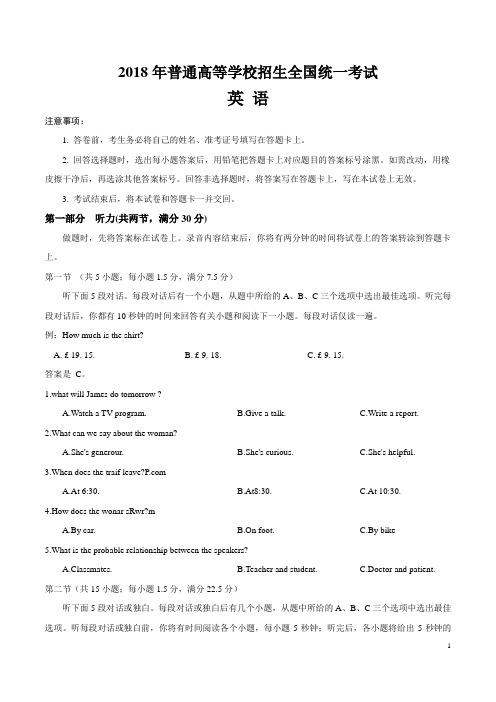
2018年普通高等学校招生全国统一考试英语注意事项:1. 答卷前,考生务必将自己的姓名、准考证号填写在答题卡上。
2. 回答选择题时,选出每小题答案后,用铅笔把答题卡上对应题目的答案标号涂黑。
如需改动,用橡皮擦干净后,再选涂其他答案标号。
回答非选择题时,将答案写在答题卡上,写在本试卷上无效。
3. 考试结束后,将本试卷和答题卡一并交回。
第一部分听力(共两节,满分30分)做题时,先将答案标在试卷上。
录音内容结束后,你将有两分钟的时间将试卷上的答案转涂到答题卡上。
第一节(共5小题;每小题1.5分,满分7.5分)听下面5段对话。
每段对话后有一个小题,从题中所给的A、B、C三个选项中选出最佳选项。
听完每段对话后,你都有10秒钟的时间来回答有关小题和阅读下一小题。
每段对话仅读一遍。
例:How much is the shirt?A. £ 19. 15.B. £ 9. 18.C. £ 9. 15.答案是C。
1.what will James do tomorrow ?A.Watch a TV program.B.Give a talk.C.Write a report.2.What can we say about the woman?A.She's generour.B.She's curious.C.She's helpful.3.When does the traif leave?A.At 6:30.B.At8:30.C.At 10:30.4.How does the wonar sRwr?mA.By car.B.On foot.C.By bike5.What is the probable relationship between the speakers?A.Classmates.B.Teacher and student.C.Doctor and patient.第二节(共15小题;每小题1.5分,满分22.5分)听下面5段对话或独白。
完整版2018年高考英语全国1卷试题及答案
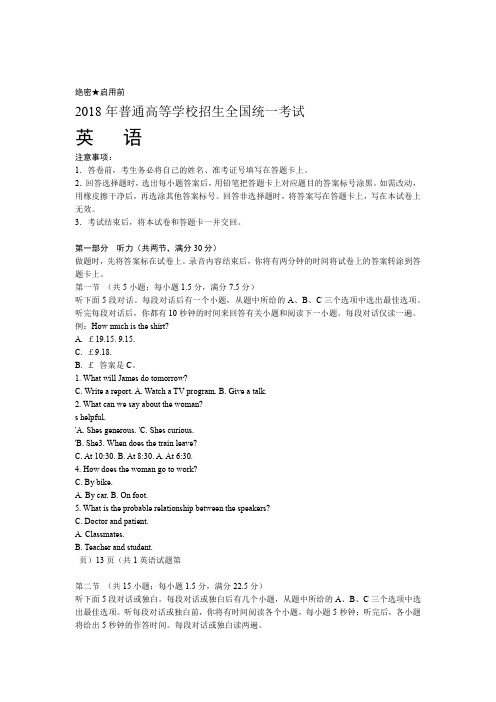
绝密★启用前2018年普通高等学校招生全国统一考试英语注意事项:1.答卷前,考生务必将自己的姓名、准考证号填写在答题卡上。
2.回答选择题时,选出每小题答案后,用铅笔把答题卡上对应题目的答案标号涂黑。
如需改动,用橡皮擦干净后,再选涂其他答案标号。
回答非选择题时,将答案写在答题卡上,写在本试卷上无效。
3.考试结束后,将本试卷和答题卡一并交回。
第一部分听力(共两节,满分30分)做题时,先将答案标在试卷上。
录音内容结束后,你将有两分钟的时间将试卷上的答案转涂到答题卡上。
第一节(共5小题;每小题1.5分,满分7.5分)听下面5段对话。
每段对话后有一个小题,从题中所给的A、B、C三个选项中选出最佳选项。
听完每段对话后,你都有10秒钟的时间来回答有关小题和阅读下一小题。
每段对话仅读一遍。
例:How much is the shirt?A. £19.15. 9.15.C. £9.18.B. £答案是C。
1. What will James do tomorrow?C. Write a report. A. Watch a TV program. B. Give a talk.2. What can we say about the woman?s helpful.'A. Shes generous. 'C. Shes curious.'B. She3. When does the train leave?C. At 10:30. B. At 8:30. A. At 6:30.4. How does the woman go to work?C. By bike.A. By car.B. On foot.5. What is the probable relationship between the speakers?C. Doctor and patient.A. Classmates.B. Teacher and student.页)13页(共1英语试题第第二节(共15小题;每小题1.5分,满分22.5分)听下面5段对话或独白。
2018年高考英语新课标1全国卷(word版含答案)
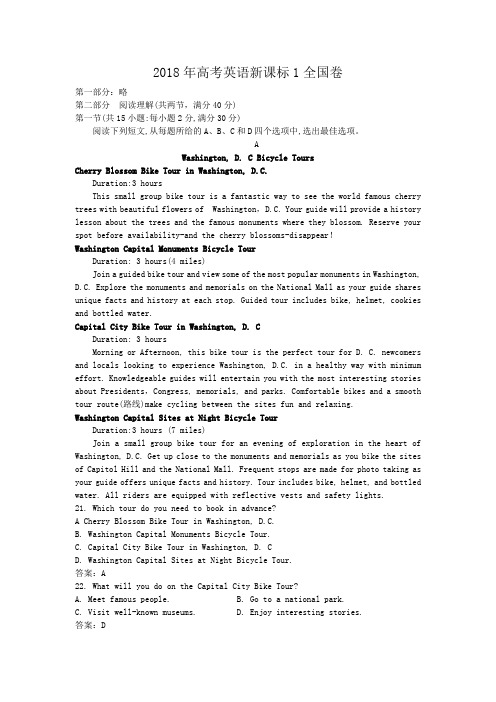
2018年高考英语新课标1全国卷第一部分:略第二部分阅读理解(共两节,满分40分)第一节(共15小题:每小题2分,满分30分)阅读下列短文,从每题所给的A、B、C和D四个选项中,选出最佳选项。
AWashington, D. C Bicycle ToursCherry Blossom Bike Tour in Washington, D.C.Duration:3 hoursThis small group bike tour is a fantastic way to see the world famous cherry trees with beautiful flowers of Washington,D.C. Your guide will provide a history lesson about the trees and the famous monuments where they blossom. Reserve your spot before availability-and the cherry blossoms-disappear!Washington Capital Monuments Bicycle TourDuration: 3 hours(4 miles)Join a guided bike tour and view some of the most popular monuments in Washington, D.C. Explore the monuments and memorials on the National Mall as your guide shares unique facts and history at each stop. Guided tour includes bike, helmet, cookies and bottled water.Capital City Bike Tour in Washington, D. CDuration: 3 hoursMorning or Afternoon, this bike tour is the perfect tour for D. C. newcomers and locals looking to experience Washington, D.C. in a healthy way with minimum effort. Knowledgeable guides will entertain you with the most interesting stories about Presidents,Congress, memorials, and parks. Comfortable bikes and a smooth tour route(路线)make cycling between the sites fun and relaxing.Washington Capital Sites at Night Bicycle TourDuration:3 hours (7 miles)Join a small group bike tour for an evening of exploration in the heart of Washington, D.C. Get up close to the monuments and memorials as you bike the sites of Capitol Hill and the National Mall. Frequent stops are made for photo taking as your guide offers unique facts and history. Tour includes bike, helmet, and bottled water. All riders are equipped with reflective vests and safety lights.21. Which tour do you need to book in advance?A Cherry Blossom Bike Tour in Washington, D.C.B. Washington Capital Monuments Bicycle Tour.C. Capital City Bike Tour in Washington,D. CD. Washington Capital Sites at Night Bicycle Tour.答案:A22. What will you do on the Capital City Bike Tour?A. Meet famous people.B. Go to a national park.C. Visit well-known museums.D. Enjoy interesting stories.答案:D23. Which of the following does the bicycle tour at night provide?A. City maps.B. Cameras.C. Meals.D. Safety lights.答案:DBGood Morning Britain's Susanna Reid is used to grilling guests on the sofa every morning,but she is cooking up a storm in her latest role - showing families how to prepare delicious and nutritious meals on a tight budget。
(完整word版)2018年高考英语真题(新课标全国一卷)有答案(2)
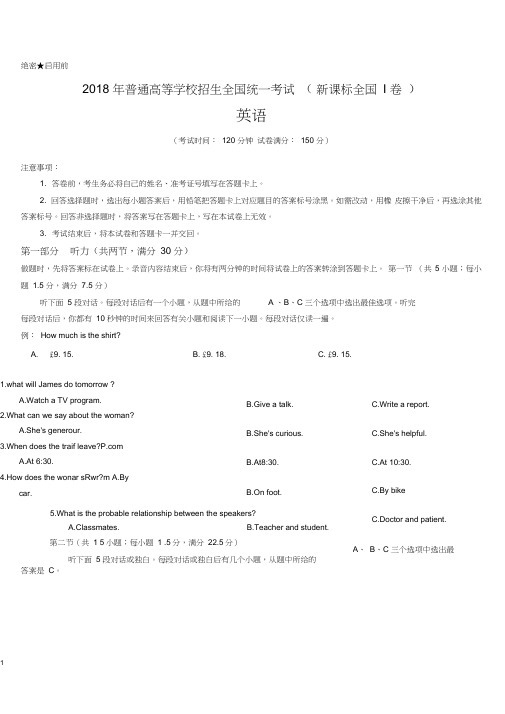
绝密★启用前2018 年普通高等学校招生全国统一考试(新课标全国I 卷)英语(考试时间:120 分钟试卷满分:150 分)注意事项:1. 答卷前,考生务必将自己的姓名、准考证号填写在答题卡上。
2. 回答选择题时,选出每小题答案后,用铅笔把答题卡上对应题目的答案标号涂黑。
如需改动,用橡皮擦干净后,再选涂其他答案标号。
回答非选择题时,将答案写在答题卡上,写在本试卷上无效。
3. 考试结束后,将本试卷和答题卡一并交回。
第一部分听力(共两节,满分30 分)做题时,先将答案标在试卷上。
录音内容结束后,你将有两分钟的时间将试卷上的答案转涂到答题卡上。
第一节(共5 小题;每小题 1.5 分,满分7.5 分)听下面 5 段对话。
每段对话后有一个小题,从题中所给的 A 、B、C 三个选项中选出最佳选项。
听完每段对话后,你都有10 秒钟的时间来回答有关小题和阅读下一小题。
每段对话仅读一遍。
例:How much is the shirt?A. £9. 15. 答案是C。
B. £9. 18.C. £9. 15.1.what will James do tomorrow ?A.Watch a TV program.2.What can we say about the woman?A.She's generour.3.When does the traif leave?A.At 6:30.4.How does the wonar sRwr?m A.By car.B.Give a talk.B.She's curious.B.At8:30.B.On foot.5.What is the probable relationship between the speakers?A.Classmates.B.Teacher and student.第二节(共 1 5小题;每小题 1 .5分,满分22.5分)听下面 5 段对话或独白。
2018年高考英语真题(新课标全国一卷)有答案

绝密★启用前2018年普通高等学校招生全国统一考试(新课标全国I卷)英语(考试时间:120分钟试卷满分:150分)注意事项:1. 答卷前,考生务必将自己的姓名、准考证号填写在答题卡上。
2. 回答选择题时,选出每小题答案后,用铅笔把答题卡上对应题目的答案标号涂黑。
如需改动,用橡皮擦干净后,再选涂其他答案标号。
回答非选择题时,将答案写在答题卡上,写在本试卷上无效。
3. 考试结束后,将本试卷和答题卡一并交回。
第一部分听力(共两节,满分30分)做题时,先将答案标在试卷上。
录音内容结束后,你将有两分钟的时间将试卷上的答案转涂到答题卡上。
第一节(共5小题;每小题1.5分,满分7.5分)听下面5段对话。
每段对话后有一个小题,从题中所给的A、B、C三个选项中选出最佳选项。
听完每段对话后,你都有10秒钟的时间来回答有关小题和阅读下一小题。
每段对话仅读一遍。
例:How much is the shirt?A. £ 19. 15.B. £ 9. 18.C. £ 9. 15.答案是C。
1.what will James do tomorrow ?A.Watch a TV program.B.Give a talk.C.Write a report.2.What can we say about the woman?A.She's generour.B.She's curious.C.She's helpful.3.When does the traif leave?A.At 6:30.B.At8:30.C.At 10:30.4.How does the wonar sRwr?mA.By car.B.On foot.C.By bike5.What is the probable relationship between the speakers?A.Classmates.B.Teacher and student.C.Doctor and patient.第二节(共15小题;每小题1.5分,满分22.5分)听下面5段对话或独白。
2018年高考英语全国卷I新课标I试题及答案word
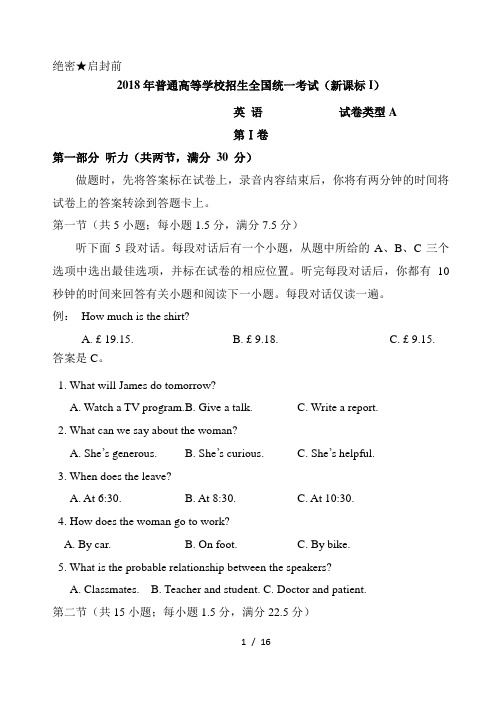
绝密★启封前2018年普通高等学校招生全国统一考试(新课标I)英语试卷类型A第Ⅰ卷第一部分听力(共两节,满分30 分)做题时,先将答案标在试卷上,录音内容结束后,你将有两分钟的时间将试卷上的答案转涂到答题卡上。
第一节(共5小题;每小题1.5分,满分7.5分)听下面5段对话。
每段对话后有一个小题,从题中所给的A、B、C三个选项中选出最佳选项,并标在试卷的相应位置。
听完每段对话后,你都有10秒钟的时间来回答有关小题和阅读下一小题。
每段对话仅读一遍。
例:How much is the shirt?A. £ 19.15.B. £ 9.18.C. £ 9.15. 答案是C。
1. What will James do tomorrow?A. Watch a TV program.B. Give a talk.C. Write a report.2. What can we say about the woman?A. She’s generous.B. She’s curious.C. She’s helpful.3. When does the leave?A. At 6:30.B. At 8:30.C. At 10:30.4. How does the woman go to work?A. By car.B. On foot.C. By bike.5. What is the probable relationship between the speakers?A. Classmates.B. Teacher and student.C. Doctor and patient.第二节(共15小题;每小题1.5分,满分22.5分)1 / 16听下面5段对话或独白。
每段对话或独白后有几个小题,从题中所给的A、B、C三个选项中选出最佳选项,并标在试卷的相应位置。
听每段对话或独白前,你将有时间阅读各个小题,每小题5秒钟;听完后,各小题将给出5秒钟的作答时间。
2018年高考英语全国卷1 word版 含参考答案及解析
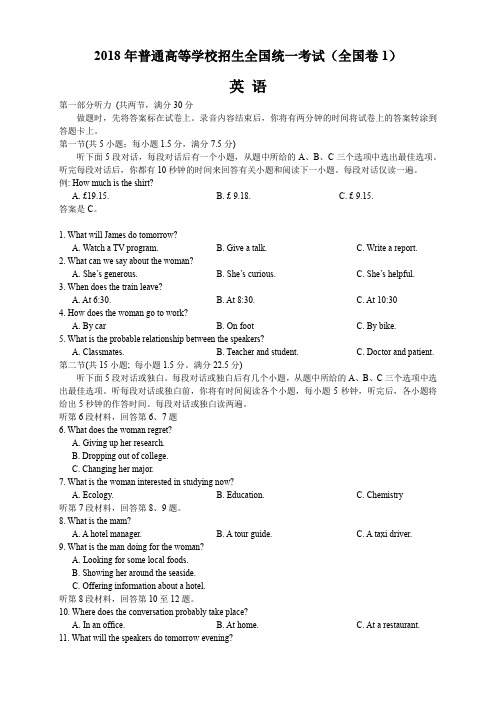
2018年普通高等学校招生全国统一考试(全国卷1)英语第一部分听力(共两节,满分30分做题时,先将答案标在试卷上。
录音内容结束后,你将有两分钟的时间将试卷上的答案转涂到答题卡上。
第一节(共5小题;每小题1.5分,满分7.5分)听下面5段对话,每段对话后有一个小题,从题中所给的A、B、C三个选项中选出最佳选项。
听完每段对话后,你都有10秒钟的时间来回答有关小题和阅读下一小题。
每段对话仅读一遍。
例: How much is the shirt?A. £19.15.B. £ 9.18.C. £ 9.15.答案是C。
1. What will James do tomorrow?A. Watch a TV program.B. Give a talk.C. Write a report.2. What can we say about the woman?A. She’s generous.B. She’s curious.C. She’s helpful.3. When does the train leave?A. At 6:30.B. At 8:30.C. At 10:304. How does the woman go to work?A. By carB. On footC. By bike.5. What is the probable relationship between the speakers?A. Classmates.B. Teacher and student.C. Doctor and patient.第二节(共15小题; 每小题1.5分。
满分22.5分)听下面5段对话或独白。
每段对话或独白后有几个小题,从题中所给的A、B、C三个选项中选出最佳选项。
听每段对话或独白前,你将有时间阅读各个小题,每小题5秒钟,听完后,各小题将给出5秒钟的作答时间。
每段对话或独白读两遍。
2018年高考英语全国1卷试卷及答案(清晰word版)
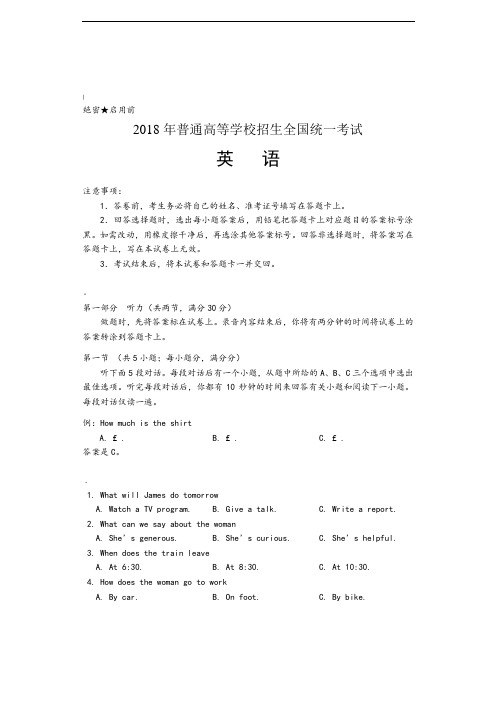
|绝密★启用前2018年普通高等学校招生全国统一考试英语注意事项:1.答卷前,考生务必将自己的姓名、准考证号填写在答题卡上。
2.回答选择题时,选出每小题答案后,用铅笔把答题卡上对应题目的答案标号涂黑。
如需改动,用橡皮擦干净后,再选涂其他答案标号。
回答非选择题时,将答案写在答题卡上,写在本试卷上无效。
3.考试结束后,将本试卷和答题卡一并交回。
·第一部分听力(共两节,满分30分)做题时,先将答案标在试卷上。
录音内容结束后,你将有两分钟的时间将试卷上的答案转涂到答题卡上。
第一节(共5小题;每小题分,满分分)听下面5段对话。
每段对话后有一个小题,从题中所给的A、B、C三个选项中选出最佳选项。
听完每段对话后,你都有10秒钟的时间来回答有关小题和阅读下一小题。
每段对话仅读一遍。
例:How much is the shirtA. £.B. £.C. £.答案是C。
1. What will James do tomorrowA. Watch a TV program.B. Give a talk.C. Write a report.2. What can we say about the womanA. She’s generous.B. She’s curious.C. She’s helpful.3. When does the train leaveA. At 6:30.B. At 8:30.C. At 10:30.4. How does the woman go to workA. By car.B. On foot.C. By bike.`5. What is the probable relationship between the speakersA. Classmates.B. Teacher and student.C. Doctor and patient.第二节(共15小题;每小题分,满分分)听下面5段对话或独白。
(完整word)2018年全国卷Ⅰ英语高考试题word精校版(含答案),推荐文档
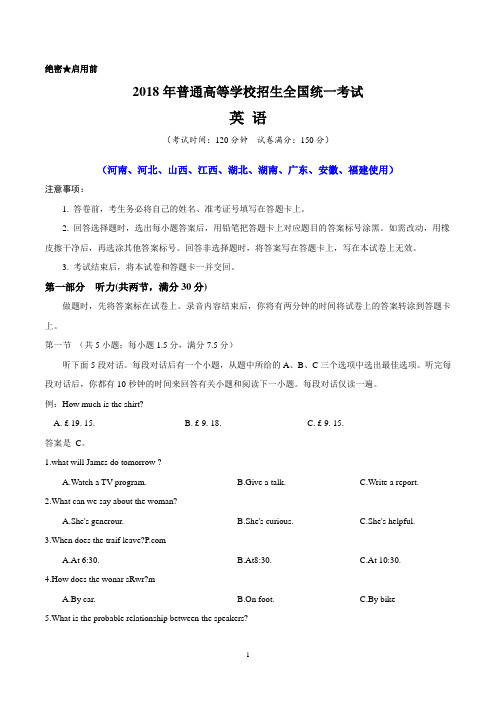
绝密★启用前2018年普通高等学校招生全国统一考试英语(考试时间:120分钟试卷满分:150分)(河南、河北、山西、江西、湖北、湖南、广东、安徽、福建使用)注意事项:1. 答卷前,考生务必将自己的姓名、准考证号填写在答题卡上。
2. 回答选择题时,选出每小题答案后,用铅笔把答题卡上对应题目的答案标号涂黑。
如需改动,用橡皮擦干净后,再选涂其他答案标号。
回答非选择题时,将答案写在答题卡上,写在本试卷上无效。
3. 考试结束后,将本试卷和答题卡一并交回。
第一部分听力(共两节,满分30分)做题时,先将答案标在试卷上。
录音内容结束后,你将有两分钟的时间将试卷上的答案转涂到答题卡上。
第一节(共5小题;每小题1.5分,满分7.5分)听下面5段对话。
每段对话后有一个小题,从题中所给的A、B、C三个选项中选出最佳选项。
听完每段对话后,你都有10秒钟的时间来回答有关小题和阅读下一小题。
每段对话仅读一遍。
例:How much is the shirt?A. £ 19. 15.B. £ 9. 18.C. £ 9. 15.答案是C。
1.what will James do tomorrow ?A.Watch a TV program.B.Give a talk.C.Write a report.2.What can we say about the woman?A.She's generour.B.She's curious.C.She's helpful.3.When does the traif leave?A.At 6:30.B.At8:30.C.At 10:30.4.How does the wonar sRwr?mA.By car.B.On foot.C.By bike5.What is the probable relationship between the speakers?A.Classmates.B.Teacher and student.C.Doctor and patient.第二节(共15小题;每小题1.5分,满分22.5分)听下面5段对话或独白。
2018年高考英语真题(新课标全国一卷)有答案
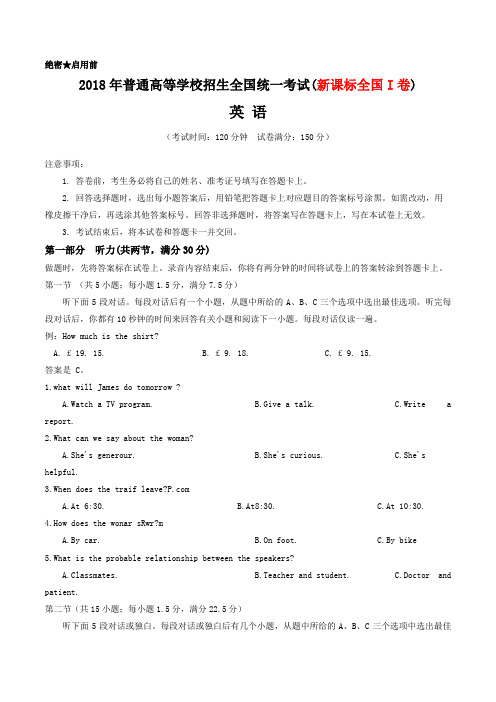
绝密★启用前2018年普通高等学校招生全国统一考试(新课标全国I卷)英语(考试时间:120分钟试卷满分:150分)注意事项:1. 答卷前,考生务必将自己的姓名、准考证号填写在答题卡上。
2. 回答选择题时,选出每小题答案后,用铅笔把答题卡上对应题目的答案标号涂黑。
如需改动,用橡皮擦干净后,再选涂其他答案标号。
回答非选择题时,将答案写在答题卡上,写在本试卷上无效。
3. 考试结束后,将本试卷和答题卡一并交回。
第一部分听力(共两节,满分30分)做题时,先将答案标在试卷上。
录音内容结束后,你将有两分钟的时间将试卷上的答案转涂到答题卡上。
第一节(共5小题;每小题1.5分,满分7.5分)听下面5段对话。
每段对话后有一个小题,从题中所给的A、B、C三个选项中选出最佳选项。
听完每段对话后,你都有10秒钟的时间来回答有关小题和阅读下一小题。
每段对话仅读一遍。
例:How much is the shirt?A. £ 19. 15.B. £ 9. 18.C. £ 9. 15.答案是 C。
1.what will James do tomorrow ?A.Watch a TV program.B.Give a talk.C.Write a report.2.What can we say about the woman?A.She's generour.B.She's curious.C.She's helpful.3.When does the traif leave?A.At 6:30.B.At8:30.C.At 10:30.4.How does the wonar sRwr?mA.By car.B.On foot.C.By bike5.What is the probable relationship between the speakers?A.Classmates.B.Teacher and student.C.Doctor and patient.第二节(共15小题;每小题1.5分,满分22.5分)听下面5段对话或独白。
- 1、下载文档前请自行甄别文档内容的完整性,平台不提供额外的编辑、内容补充、找答案等附加服务。
- 2、"仅部分预览"的文档,不可在线预览部分如存在完整性等问题,可反馈申请退款(可完整预览的文档不适用该条件!)。
- 3、如文档侵犯您的权益,请联系客服反馈,我们会尽快为您处理(人工客服工作时间:9:00-18:30)。
绝密★启用前2018年普通高等学校招生全国统一考试(新课标全国I卷)英语(考试时间:120分钟试卷满分:150分)注意事项:1. 答卷前,考生务必将自己的姓名、准考证号填写在答题卡上。
2. 回答选择题时,选出每小题答案后,用铅笔把答题卡上对应题目的答案标号涂黑。
如需改动,用橡皮擦干净后,再选涂其他答案标号。
回答非选择题时,将答案写在答题卡上,写在本试卷上无效。
3. 考试结束后,将本试卷和答题卡一并交回。
第一部分听力(共两节,满分30分)做题时,先将答案标在试卷上。
录音内容结束后,你将有两分钟的时间将试卷上的答案转涂到答题卡上。
第一节(共5小题;每小题1.5分,满分7.5分)听下面5段对话。
每段对话后有一个小题,从题中所给的A、B、C三个选项中选出最佳选项。
听完每段对话后,你都有10秒钟的时间来回答有关小题和阅读下一小题。
每段对话仅读一遍。
例:How much is the shirt?A. £ 19. 15.B. £ 9. 18.C. £ 9. 15.答案是C。
1.what will James do tomorrow ?A.Watch a TV program.B.Give a talk.C.Write a report.2.What can we say about the woman?A.She's generour.B.She's curious.C.She's helpful.3.When does the traif leave?A.At 6:30.B.At8:30.C.At 10:30.4.How does the wonar sRwr?mA.By car.B.On foot.C.By bike5.What is the probable relationship between the speakers?A.Classmates.B.Teacher and student.C.Doctor and patient.第二节(共15小题;每小题1.5分,满分22.5分)听下面5段对话或独白。
每段对话或独白后有几个小题,从题中所给的A、B、C三个选项中选出最佳选项。
听每段对话或独白前,你将有时间阅读各个小题,每小题5秒钟;听完后,各小题将给出5秒钟的作答时间。
每段对话或独白读两遍。
听第6段材料,回答第6、7题。
6.What does the woman regret?A.Giving up her research.B.Dropping out of college.C.Changiny her major.7.What is the woman interested in studying now?A.Ecology.cation.C.Chemistry.听第7段材料,回答第8、9题。
8.What is the man?A.A hotel manager.B.A tour guide.C.A taxi driver.9.what is the man doing for the woman?A.looking for some local foods.B.Showing her around the seaside.C.Offering information about a hotel.听第8段材料,回答第10至12题。
10.Where does the conversation probably take place?A.In an office.B.At homeC.At a restaurant.11.What will the speakers do tomorow evening?A.Goto a concert.B.Visit a friendC.work extra hours.12.Who is Alice going to call?A.Mike .B.JoanC.Catherine .听第9段材料,回答第13至16题。
13.why does the woman meet the man?A.To look at an apartment.B.To deliver some furniture.C.To have a meal together.14.What does the woman like about the carpet?A.Its color.B.Its design.C. Its quality .15.What does the man say about the kitchen?A.It's a good size.B.It's newly painted.C. It's adequately equipped .16.What will the woman probably do next?A.Go downtown.B.Talk with her friend.C.Make payment .听第10段材料,回答第17至20题。
17.Who is the speaker probably talking to?A.Movie fans .B.News reporters.C.College students .18.When did the speaker take Engishlclasses?A.Before he left his hometown.B.After he came to America.C.When he was 15 years old.19.How does the speaker feel about his teacher?A.He's proud.B.He's sympathetic.C.He's grateful .20.What does the speaker mainly talk about ?A.How education shaped his life.B.How his language skills improved.C.How he managed his business well. 第二部分阅读理解(共两节,满分40分)第一节(共15小题;每小题2分,满分30分)阅读下列短文,从每题所给的A、B、C和D四个选项中,选出最佳选项。
AWashington, D.C. Bicycle ToursCherry Blossom Bike Tour in Washington, D.C.Duration TourThis small group bike tour is a fantastic way to see a world-famous cherry trees with beautiful flowers of Washington, D.C. Your guide will provide a history lesson about the trees and the famous monuments where they blossom. Reserve your spot before availability —the cherry blossoms—disappear!Washington Capital Monuments Bicycle TourDuration:3 hours (4 miles)Join a guided bike tour and view some of the most popular monuments in Washington, D.C. Explore the monuments and memorials on the National Mall as your guide shares unique facts and history at each stop. Guided tour includes bike, helmet, cookies and bottled water.Capital City Bike Tour In Washington, D.C.Duration:3 hoursMorning or Afternoon, this bike tour is the perfect tour for D. C. newcomers and locals looking to experience Washington, D.C. in a healthy way with minimum effort. Knowledgeable guides will entertain you with the most ,interesting stories about Presidents, Congress, memorials, and parks. Comfortable bikes and a smooth tour route(路线)make cycling between the sites fun and relaxing.z.xxkWashington Capital Sites at Night Bicycle TourDuration:3 hours(7miles)Join a small group bike tour for an evening of exploration in the heart of Washington, D.C. Get up close to the monuments and memorials as your bike the sites of Capitol Hill and the National Mall. Frequent stops are made for photo taking as your guide offers unique facts and history. Tour includes bike, helmet, and bottled water. All riders are equipped with reflective vests and safety lights.21.Whichtour do you need to book in advance?A. Cherry Blossom like Tour in Washington, D.C.B. Washington capital Monuments Bicycle Tour.C. Capital City Bike Tour in Washington,D.C.D. Washington Capital Sites at Night Bicycle Tour.22.What will you do on the Capital City Bike Tour?A. Meet famous people.B. Go to a national park.C. Visit well-known museums.D. Enjoy interesting stories.23.Which of the following does the bicycle tour at night provide?A. City maps.B. Cameras.C. MealsD. Safety lightsBGood Morning Britain’s Susanna Reid is used to grilling guests on the sofa every morning, but she is cooking up a storm in her latest role —showing families how to prepare delicious and nutritious meals on a tight budget.In Save Money: Good Food, she visits a different home each week and with the help of chef Matt Tebbutt offers top tips on how to reduce food waste, while preparing recipes for under £5 per family a day. And the Good Morning Britain presenter says she’s been able to put a lot of what she’s leant into practice in her own home, preparing meals for sons, Sam,14, Finn,13, and Jack, 11."We love Mexican churros, so I buy them on my phone from my local Mexican takeaway restaurant," sheexplains. "I pay £5 for a portion(一份), but Matt makes them for 26p a portion, because they are flour, water, sugar and oil. Everybody can buy takeaway food, but sometimes we’re not aware how cheaply we can make this food ourselves. "The eight-part series(系列节自), Save Money: Good Food, follows in the footsteps of ITV’s Save Money: Good Health, which gave viewers advice on how to get value from the vast range of health products on the market.With food our biggest weekly household expense, Susanna and Matt spend time with a different family each week. In tonight’s Easter special they come to the aid of a family in need of some delicious inspiration on a budget. The team transforms the family’s long weekend of celebration with less expensive but still tasty recipes.24. What do we know about Susanna Reid?A. She enjoys embarrassing her guests.B. She has started a new programme.C. She dislikes working early in the morning.D. She has had a light budget for her family.25. How does Matt Tebbutt help Susanna?A. He buys cooking materials for her.B. He prepares food for her kids.C. He assists her in cooking matters.D. He invites guest families for her.26. What does the author intend to do in paragraph 4?A. Summarize the previous paragraphs.B. Provide some advice for the readers.C. Add some background information.D. Introduce a new topic for discussion.27. What can be a suitable title for the text?A. Keeping Fit by Eating SmartB. Balancing Our Daily DietC. Making yourself a Perfect ChefD. Cooking Well for LessCLanguages have been coming and going for thousands of years, but in recent times there has been less coming and a lot more going. When the the world was still populated by hunter-gatherers,small, tightly knit (联系)groups developed their own patterns of speech independent of each other.Some language experts believe that 10,000 years ago, when the world had just five to ten million people, they spoke perhaps 12,000 languages between them.Soon afterwards, many of those people started settling down to become farmers, and their languages too became more settled and fewer in number. In recent centres, trade,industrialisation. the development of the nation-state and the spread of universal compulsory education. Especially glbalisation and better communications in the past few decades,all have caused many Languages to disappear,and dominant languages such as English.Spanish and Chinese are increasingly taking over.At present, the world has about 6 800 languages. The distribution of these languages is hugely uneven. The general rule is that mild zones have relatively few languages. Often spoken by many people while hot. wet zones have lots, often spoken by small numbers.Europe has only around 200 Languages: the Americas about 1,000. Africa 2 400; and Asia and the Pacific perhaps 3,200, of which Papua New Guinea alone accounts for well over 800. The median number (中位数)of speakers is a mere 6.000, which means that half the worlds languages are spoken by fewer people than that.z.x.xkAlready well over 400 of the total of, 6,800 languages are close to extinction(消亡), with only a few elderly speakers left. Pick, at random, Busuu in Cameroon (eight remaining speakers),Chiapaneco in Mexico(150). LipanApache in the United States(two or three)or Wadjigu in Australia (one, with a question-mark): none of these seems to have much chance of survival.28. What can we infer about languages in huntergatherer times?A.They developed very fast.B. They were large in number.C. They had similar patters.D. They were closely connected29. Which of the following best explains"dominant " underlined in paragraph 2?plex.B. Advanced.C.Powerful.D.Modem.30. How many languages are spoken by less than 6, 000 people at present?A.About 6 800B.About 3 400C.About 2.400D.About 1-20031. What is the min idea of the text?A. New languages will be created.B Peoples lifestyles are reflected in languagesC. Human development results in fewer languagesD. Geography determines language evolution.DWe may think we're a culture that gets rid of our worn technology at the first sight of something shiny and new, but a new study shows that we keep using our old devices(装置) well after they go out of style. That’s bad news for the environment — and our wallets — as these outdated devices consume much more energy than the newer ones that do the same things.To figure out how much power these devices are using, Callie Babbitt and her colleagues at the Rochester Institute of Technology in New York tracked the environmental costs for each product throughout its life — from when its minerals are mined to when we stop using the device. This method provided a readout for how home energy use has evolved since the early 1990s. Devices were grouped by generation — Desktop computers, basic mobile phones, and box-set TVs defined 1992. Digital cameras arrived on the scene in 1997. And MP3 players, smart phones, and LCD TVs entered homes in 2002, before tablets and e-readers showed up in 2007.As we accumulated more devices, however, we didn't throw out our old ones. "The living-room television is replaced and gets planted in the kids' room, and suddenly one day, you have a TV in every room of the house," said one researcher. The average number of electronic devices rose from four per household in 1992 to 13 in 2007. We're not just keeping these old devices — we continue to use them. According to the analysis of Babbitt's team, old desktop monitors and box TVs with cathode ray tubes are the worst devices with their energy consumption and contribution to greenhouse gas emissions(排放)more than doubling during the 1992 to 2007 window.So what's the solution(解决方案)? The team's data only went up to 2007, but the researchers also explored what would happen if consumers replaced old products with new electronics that serve more than one function, such as a tablet for word processing and TV viewing. They found that more on-demand entertainment viewing on tablets instead of TVs and desktop computers could cut energy consumption by 44%.32. What does the author think of new devices?A. They are environment-friendly.B. They are no better than the old.C. They cost more to use at home.D. They go out of style quickly.33. Why did Babbitt's team conduct the research?A. To reduce the cost of minerals.B. To test the life cycle of a product.C. To update consumers on new technology.D. To find out electricity consumption of the devices.34. Which of the following uses the least energy?A. The box-set TV.B. The tablet.C. The LCD TV.D. The desktop computer.35. What does the text suggest people do about old electronic devices?A. Stop using them.B. Take them apart .C. Upgrade them.D. Recycle them.第二节(共5小题;每小题2分,满分10分)根据短文内容,从短文后的选项中选出能填入空白处的最佳选项。
